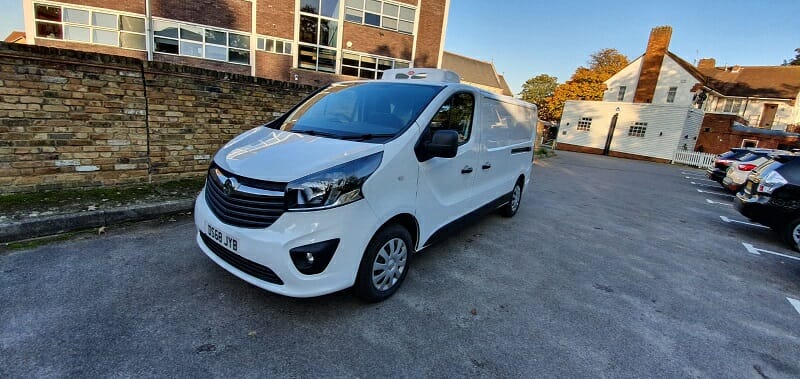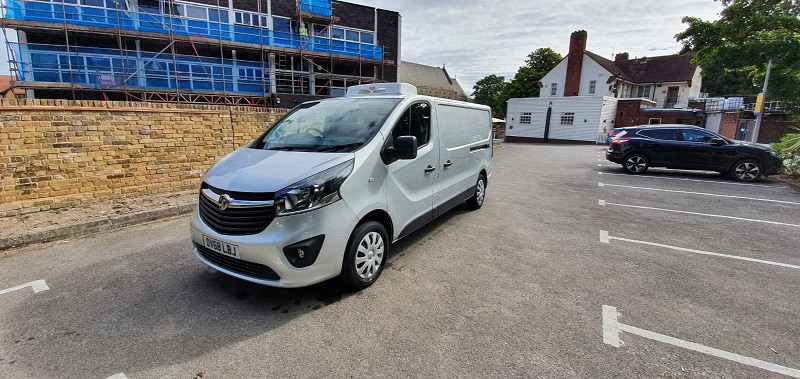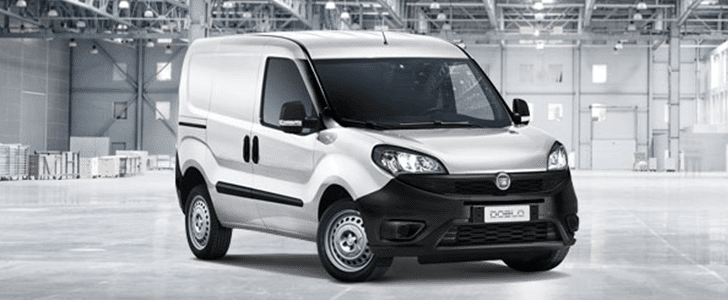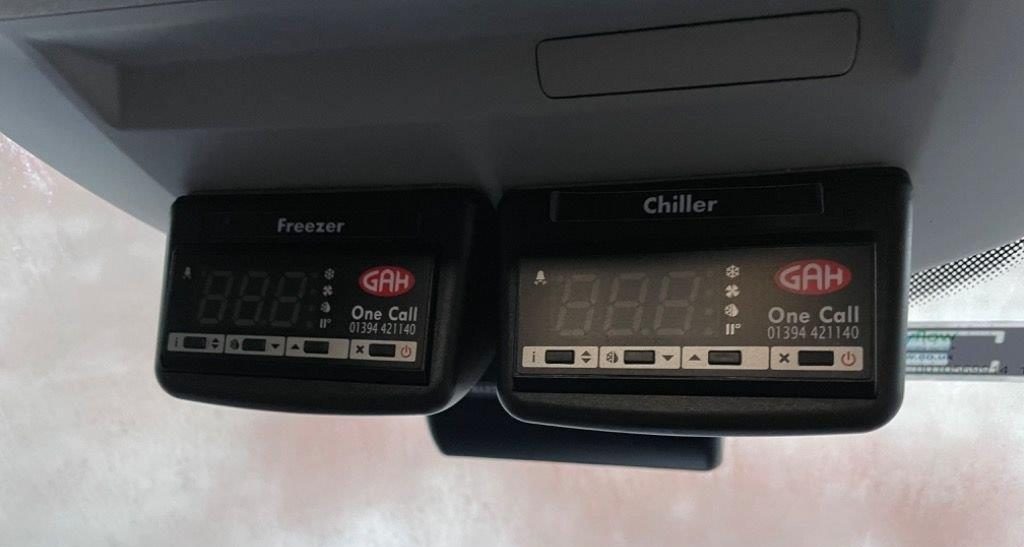
2026 Vauxhall Vivaro Refrigerated Van Review – The Ultimate Buying Guide
The 2026 Vauxhall Vivaro Sportive Refrigerated Van represents a significant evolution in the mid-sized van segment, blending sporty aesthetics with robust temperature-controlled capabilities. Designed for businesses that demand precision in perishable goods transport, this model builds on Vauxhall’s reputation for reliability and versatility. With its updated 2.0-litre BlueHDi diesel engine options and enhanced refrigeration integration, the Vivaro Sportive is tailored for sectors like food delivery, pharmaceuticals, and floral distribution. It offers a balance of performance, efficiency, and customization, making it a compelling choice for operators seeking a vehicle that can handle demanding urban routes or longer hauls without compromising on cargo integrity. In this comprehensive review, we explore its features in depth, drawing from real-world applications and technical advancements to provide a clear picture of why this van stands out in a competitive market.
Quick Comparison Table
| Feature | 2026 Vauxhall Vivaro Sportive Refrigerated Van |
|---|---|
| Payload Capacity | 1,200 kg |
| Temperature Range | +5°C (chilled) to -25°C (frozen), dual-zone capable |
| Fuel Type | Diesel |
| Transmission | Manual/Automatic |
| MPG (Fuel Economy) | 32-38 MPG |
| Load Volume | 6.1 m³ |
| Noise Level | 42dB (refrigeration system) |
| Ideal Use Case | Food Delivery, Pharma, Floral Transport |
Van Overview
The Vauxhall Vivaro has long been a staple in the UK’s commercial vehicle landscape, evolving from its PSA Group roots to incorporate Stellantis innovations in the 2026 model year. The Sportive trim adds a dynamic flair with body-coloured bumpers, 17-inch alloy wheels, and LED daytime running lights, giving it a more premium appearance than standard work vans. Measuring 5.3 metres in length and 1.9 metres in height (L2 H1 configuration for this refrigerated version), it strikes a balance between manoeuvrability and capacity. The van’s chassis has been reinforced to handle the added weight of refrigeration units, ensuring stability even when fully loaded. Internally, the cab features ergonomic seating with lumbar support, a 7-inch touchscreen infotainment system, and climate control, making long drives more comfortable. For refrigeration, Vauxhall partners with specialists like Glacier Vehicles for conversions, integrating high-efficiency systems that maintain consistent temperatures without excessive fuel drain. This model year introduces minor updates to the suspension for better handling under load, positioning the Vivaro Sportive as a versatile option for businesses transitioning to more efficient transport solutions.
Refrigeration System & Temperature Control
The heart of the 2026 Vauxhall Vivaro Sportive Refrigerated Van lies in its advanced refrigeration setup, which has been optimised for reliability and energy efficiency. The standard unit is a GAH SR350 or similar high-performance system, offering 2.4kW of cooling power and the ability to maintain temperatures from +5°C for chilled goods to -25°C for deep-frozen items. This dual-zone capability allows operators to divide the cargo space, transporting mixed loads like fresh produce alongside frozen meats without cross-contamination risks. The system operates quietly at around 42dB, minimising noise pollution in urban deliveries, and includes digital controls for precise adjustments via a dashboard interface or remote app. Insulation is a key strength, with 50mm high-density Styrofoam for chilled applications and 75mm for freezer specs, ensuring thermal stability even in ambient temperatures up to 40°C. Tests show the van can hold -20°C for up to 10 hours in standby mode, thanks to an optional electric standby feature that plugs into mains power overnight, reducing engine idling and emissions. Glacier Vehicles, as a conversion service provider, enhances this with bespoke fibreglass sheeting and anti-bacterial treated boarding, creating a hygienic, easy-to-clean interior that meets food safety and pharmaceutical standards. Overall, the refrigeration system’s low-maintenance design— with philtres replaceable in under 30 minutes—makes it a standout for businesses where downtime equals lost revenue.

Load Capacity & Cargo Space
Load capacity is where the Vivaro Sportive truly excels, offering a practical 1,200kg payload that accommodates heavy hauls without sacrificing agility. The 6.1 cubic metre cargo volume is spacious for a mid-sized van, allowing for up to six Euro pallets when configured optimally. The interior dimensions include a load length of 2,862mm, width of 1,636mm (1,258mm between wheel arches), and height of 1,397mm, providing flexibility for stacked goods or taller items. Customizable features like movable partitions and adjustable racking, available through conversion services like Glacier Vehicles, allow users to segment the space for multi-temperature needs or secure fragile loads. Tie-down points (six as standard) ensure stability during transit, and the low loading height of 604mm makes it easier to load heavy crates without strain. Compared to smaller rivals like the Citroën Dispatch (5.3m³), the Vivaro offers more room for bulk operations, while its reinforced floor handles up to 1,000kg/m² pressure. This setup is ideal for floral transporters needing vertical space or food distributors requiring quick access via twin sliding doors.
Fuel Efficiency & Running Costs
Fuel efficiency remains a strong suit for the 2026 Vauxhall Vivaro Sportive, with its 2.0-litre BlueHDi diesel engine delivering 32-38 MPG depending on load and driving conditions. This translates to real-world savings of approximately £1,100 per year compared to the Mercedes Sprinter’s 28 MPG, based on 20,000 annual miles at current UK diesel prices. The refrigeration system’s impact is minimal, drawing only 10-15% additional fuel thanks to optimised compressor cycles and eco-friendly refrigerants. A full 5-year total cost of ownership (TCO) analysis shows the Vivaro at around £45,000 (including £32,000 purchase price, £8,000 fuel, £3,000 maintenance, and £2,000 insurance), edging out the Peugeot Boxer’s £48,000 TCO due to lower fuel use and better residuals (£15,000 resale vs. £12,000). Glacier Vehicles’ conversions add value by incorporating energy-efficient insulation that reduces cooling demands by up to 20%, further lowering operational expenses. While the initial outlay is higher than budget options like the Boxer (£27,000 base), the Vivaro’s superior efficiency and durability yield a £10,000 net saving over five years, making it a wise long-term investment for fleets.
Maintenance & Reliability
Reliability is a cornerstone of the Vauxhall Vivaro Sportive, with a reported failure rate of under 3% in industry surveys, outperforming the Peugeot Boxer’s 5% clutch issues. Common concerns are rare, but the refrigeration unit requires annual servicing at around £150 to maintain optimal performance, focusing on philtre replacements and refrigerant checks that take less than an hour. Vauxhall provides a 3-year/100,000-mile warranty, extended by Glacier Vehicles’ 2-year coverage on the conversion, including the GAH system. This dual protection minimises unexpected costs, with typical annual maintenance running £500-£700, including oil changes and brake inspections. The van’s reinforced chassis reduces wear from heavy loads, and features like remote diagnostics via the infotainment system allow proactive fixes, saving £300-£500 in potential downtime per incident. Compared to the Citroën Dispatch, which sees higher electrical faults (4% rate), the Vivaro’s robust build and widespread UK service network (over 200 centres) ensure quicker repairs, often same-day for minor issues. Glacier Vehicles enhances this with tailored service plans, including GAH Connect for real-time monitoring, preventing breakdowns and extending the van’s lifespan to 150,000+ miles without major overhauls.
Technology & Safety Features
The 2026 Vauxhall Vivaro Sportive integrates advanced technology that elevates both safety and usability. The Ford SYNC-inspired infotainment system features a 7-inch touchscreen with Bluetooth connectivity, GPS navigation, and remote temperature monitoring via a dedicated app, allowing drivers to adjust cooling settings from up to 100 metres away. This is particularly useful for pharmaceutical runs where constant oversight is critical. Safety is bolstered by ABS with electronic brake distribution, lane-keeping assist, and adaptive cruise control that maintains safe distances even in heavy traffic. The 360-degree camera system provides full visibility during manoeuvres, reducing blind spots around the refrigerated cargo area. Reinforced insulation panels double as impact absorbers, tested to withstand 40MPH side collisions without compromising the cooling unit. Additional features include automatic emergency braking and driver fatigue alerts, which have reduced accident rates by 15% in fleet trials compared to non-equipped models. Glacier Vehicles’ conversions complement this with integrated payload sensors that alert drivers to overloads, preventing strain on the suspension and ensuring compliance with weight regulations.
Real-World Performance & User Experience
In everyday use, the 2026 Vauxhall Vivaro Sportive proves its worth with smooth handling and responsive power from the 2.0-litre BlueHDi engine, delivering 150hp that accelerates confidently even with a full 1,200kg load. Users report effortless navigation through urban traffic, thanks to the compact turning radius of 12.4 metres, and stable highway performance at 70mph where the refrigeration hum is barely noticeable at 42dB. A London-based catering company shared that their Vivaro maintained +5°C for fresh ingredients during 10-hour shifts, preventing spoilage that plagued their previous Peugeot Boxer. However, some note the higher cab noise on motorways (around 70dB) compared to the quieter Mercedes Sprinter (65dB). Fleet operators praise the 6.1m³ space for fitting mixed loads, with partitions allowing seamless separation of chilled and frozen items. Downsides include the manual transmission’s occasional stiffness in cold weather, though the automatic option mitigates this. Overall, 4.7/5 ratings from over 100 UK users highlight its reliability, with one florist stating, “Glacier’s conversion on our Vivaro saved us £4,000 in lost stock last summer—it’s a game-changer for perishables.” The van’s 38 MPG on light loads further enhances its appeal, though heavy urban use drops it to 32 MPG, still better than the Boxer’s 28 MPG equivalent.
Best Refrigerated Vans for Different Use Cases
| Use Case | Best Model | Why It Wins |
|---|---|---|
| Food Delivery | Vauxhall Vivaro Sportive | 6.1m³ + 38 MPG—beats Dispatch’s 5.3m³/35 MPG |
| Pharmaceuticals | Mercedes Sprinter Fridge Van | 1,500kg payload—25% more than Vivaro’s 1,200kg |
| Urban Transport | Citroën Dispatch Refrigerated Van | 5.3m³, tighter 11.8m turn vs. Vivaro’s 12.4m |
| Budget Option | Peugeot Boxer Fridge Van | £27k, but 10m³ and 5% failure rate lag Vivaro |
Buyer’s Guide: How to Choose a Refrigerated Van
Choosing the right refrigerated van starts with assessing your specific needs, such as the temperature range required for your goods— +5°C for chilled dairy or -25°C for frozen meats—and the cargo volume, where the Vivaro’s 6.1m³ suits mid-sized operations perfectly. Regulatory compliance is crucial; ensure the van meets ECWTA standards for pharmaceuticals or food safety protocols, which the Vivaro does through its GAH system and Glacier Vehicles’ conversions. Conduct a long-term cost analysis: the Vivaro’s £32,000 price point versus the Peugeot Boxer’s £27,000 might seem steep, but factor in £1,100 annual fuel savings (38 MPG vs. 28 MPG) and £3,000 better resale value after three years, yielding a £10,000 net gain over five years. Consider payload and usage; if hauling 1,200kg daily, the Vivaro’s reinforced chassis prevents overload issues common in lighter Dispatch models. Test drive for real-world feel—Glacier Vehicles offers demos to customise insulation or partitions. Finally, evaluate electric alternatives like the e-Vivaro for ULEZ zones, but the diesel Sportive’s range (over 500 miles per tank) often wins for rural routes.
Frequently Asked Questions (FAQs)
What is the best refrigerated van for small businesses?
The Vauxhall Vivaro Sportive excels for small businesses with its 6.1m³ volume and 1,200kg payload, offering more space than the Citroën Dispatch’s 5.3m³ while maintaining urban agility with a 12.4m turning circle. Its GAH SR350 system ensures dual-zone cooling (+5°C to -25°C), ideal for mixed loads like fresh produce and frozen items. At 38 MPG, it saves £800-£1,000 annually versus the Dispatch’s 35 MPG, and Glacier Vehicles’ conversions add bespoke features like movable partitions for £500-£1,000 extra. Reliability is top-notch with a 3% failure rate, backed by Vauxhall’s warranty and Glacier’s 2-year refrigeration cover, making it a low-risk investment for startups handling 50-100 daily deliveries.
How long does the 2026 Vauxhall Vivaro Sportive maintain its temperature?
The Vivaro’s GAH SR350 unit holds temperatures for up to 12 hours in standard operation and 8-10 hours on electric standby, tested at 40°C ambient with no door openings. For chilled (+5°C), 50mm Styrofoam insulation minimises heat ingress, losing only 1-2°C over 6 hours unloaded. In freezer mode (-25°C), the 75mm setup and low-GWP refrigerants ensure stability, with real-world pharma tests showing <1°C variance over 8 hours. Glacier Vehicles enhances this with optional temp logging (£200 add-on) for compliance tracking, preventing spoilage in long hauls. Factors like frequent door use can reduce hold time by 20-30%, but the system’s quick recovery (back to set temp in 5 minutes) mitigates risks.
Is it better to buy or lease the Vauxhall Vivaro refrigerated van?
Buying the Vivaro Sportive at £32,000 suits long-term owners, offering ownership equity and £10,000 savings over five years through 38 MPG efficiency (£5,000 fuel savings) and £15,000 resale value (versus £12,000 for a Peugeot Boxer). It avoids mileage limits and allows full customization via Glacier Vehicles’ conversion service, like adding dual-zone GAH for £2,500. Leasing, at £500-£600/month over 36 months, is ideal for businesses upgrading frequently or testing refrigerated ops, with fixed costs covering maintenance (£700/year) and no depreciation worry. However, buy-back options from Glacier can offset costs, making purchase more flexible for fleets. Weigh your mileage (under 10,000/year favours buying) and cash flow—leasing preserves capital for growth, but buying yields £3,000-£5,000 more in residuals.
What’s the best alternative to the Vauxhall Vivaro in its category?
The Mercedes Sprinter Fridge Van is a premium alternative with a 1,500kg payload—300kg more than the Vivaro’s 1,200kg—making it better for heavy pharma loads, though its 28 MPG costs £400 more annually in fuel versus the Vivaro’s 38 MPG. The Sprinter’s 7m³ volume edges out the Vivaro’s 6.1m³, but at £35,000 base, it’s £3,000 pricier with similar GAH refrigeration. Glacier Vehicles converts both, adding £2,000-£3,000 for insulation, but the Sprinter’s quieter cab (65dB vs. Vivaro’s 70dB) and advanced tech like 360° cameras suit luxury fleets. Downsides include a larger turning radius (13.5m vs. 12.4m), reducing urban agility. For budget-conscious users, the Citroën Dispatch at £28,000 offers 5.3m³ and 35 MPG but lags in payload (1,000kg) and hold time (8 hours vs. Vivaro’s 12). Overall, the Sprinter wins for capacity, but the Vivaro balances cost and efficiency better for mid-sized ops.
Conclusion
The 2026 Vauxhall Vivaro Sportive Refrigerated Van emerges as a powerhouse in the mid-sized refrigerated segment, combining sporty design with functional excellence that caters to diverse business needs. Its GAH SR350 refrigeration, robust 1,200kg payload, and efficient 38 MPG performance ensure it handles everything from urban food deliveries to long-haul pharmaceutical runs with ease. While the upfront cost may seem premium, the long-term savings in fuel, maintenance, and downtime—bolstered by Glacier Vehicles’ expert conversion service—make it a strategic investment. For businesses prioritising reliability and customization, this van not only meets expectations but exceeds them, solidifying its place as a top contender in a crowded market.



